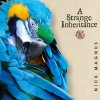"A Strange Interview…" - TWR chats to Nick Magnus about his latest album: A Strange Inheritance…
TWR: A Strange Inheritance indeed! Where did the idea for this one come from?
NM: It arose from an idea Dick Foster (the album’s lyricist) had several years ago for a stage musical. We have – shall we call it – ‘close observational experience’ of what’s involved to develop a musical, and based on that experience we realised neither of us were in a position to go down that road. It requires considerable high-risk personal financial investment of an order we couldn’t even begin to consider. Having abandoned that idea, the concept idled on the back burner for a few years. When we started looking for something on which to base this album, Dick put the idea forward again and we both thought that it had legs – in principle. We retained the central 18th century pirate theme, and also the character of Black Jack, but completely reconstructed the plot, adding the character of Philadelphia, around whom the story largely revolves. Not only is she Jack’s love interest, but also an initially tragic figure who eventually becomes the Scarlet Queen, a feared pirate in her own right. Ipso facto, your actual strong female lead! |
 Andy Neve
Andy Neve |
TWR: Had you read A General History Of The Robberies & Murders Of The Most Notorious Pirates by Captain Charles Johnson, the most renowned book on the subject of pirates before coming to the project. What were your sources as a lot of research has evidently gone into this one..?
NM: We haven’t read that book. Our sources were not specific, rather general knowledge we’ve accumulated over time. Dick’s work as a historian will certainly have informed part of it. We both share an interest in that time period, and of course the history of Anne Bonny and Mary Read, notorious female pirates who were the inspiration for who Philadelphia eventually becomes. For my part, I drew on my penchant for historical drama series such as ‘Outlander’ and ‘Black Sails’ to put me in the time and place. They may be pure fiction, but so is our story – and they provided valuable visual imagery to help illustrate the story musically. Since making the album, I was amused to see that in the pirate comedy series ‘Our Flag Means Death’, Read and Bonny feature in one episode as a pair of psychotic antiques dealers!
TWR: Blood Money, a fantastic evocation of the clash of cultures between the Old World and the New, how easy was it to piece this one together?
NM: The subject of this track is the injustices perpetrated during the Spanish invasion of the New World. It took a while to work out how to incorporate a Spanish feel to the music without it dominating in too obvious a way. The initial challenge was how to illustrate the ships appearing out of the mist, and the element of surprise the New World inhabitants would have experienced. It’s a musical red herring, so when the song proper kicks in it’s not what you’d expect the first time it’s heard. Another hurdle to solve was the nylon guitar solo, which needed a virtuoso performance. I knew I wanted John Greenwood to do it, but he lives in Adelaide! Fortunately we’re both experienced in sending performances around the world with file sharing – I sent John the track, and in return he sent back his excellent solo. Not only that but he also provided the 12-string and electric guitars on that song.
TWR: You have some new faces in Team Magnus this time, tell us a little about the new musicians involved in the project...
NM: Ginger Bennett is a talented blues, soul and jazz singer whom I hadn’t previously known. I wasn’t sure who would sing the part of the Shaman priestess on ‘Welcome To The Island’, so I called on my old friend Terry Pack (ex-Enid) who works with many people in the jazz field. It took him only a couple of seconds to say “Ginger Bennett”. He put us in touch, and the rest is history. Louise Young’s background is in musical theatre; we were introduced through mutual friends, and when I heard her sing she was a natural choice as the voice of Philadelphia on ‘To Whom It May Concern’. John Greenwood is the guitarist in Unitopia, and also plays on the United Progressive Fraternity (UPF) album ‘Planetary Overload: Hope’. As I’d also played on that album, there was already a connection. Unitopia’s Steve Unruh suggested John and I should work together, and so we have!
TWR: Philadelphia, what a striking name indeed! What was the inspiration for this character? Is it based on a historical one? |
 Ginger Bennett
Ginger Bennett |
 Louise Young
Louise Young |
NM: Inadvisable trysts between the lower and upper classes were not uncommon back then – which presumably is why the ‘kitchen maid falling for the young master of the house’ is a common literary trope. In fact, we’d watched a Netflix series called ‘The Cook of Castamar’ in which exactly that happens! Whilst our story is very different, Philadelphia’s character does share the same taste for hunky landed gentry as the cook in that series. We nearly called her Philomena, but in the course of Dick’s current research into the history of the Westminster Sanctuary, he chanced upon one of the residents named Philadelphia, which we thought was… a striking name. The chorus would have been rather different had she remained as Philomena!
TWR: Tell us a little about the Four Winds Suite, as I call it. Almost symphonic in scope, you have managed to make what's palpably invisible visible in music with this one.
NM: The idea for this was partly inspired by Benjamin Britten’s Four Sea Preludes from ‘Peter Grimes’. It was the logical choice to follow ‘At Sea At Night’, illustrating the meteorological perils faced by those making long sea voyages in the 18th century. The ‘Four Winds’ play out in sequence: Boreas (north), Notus (south), Eurus (east) and Zephyrus (west), representing a raging storm, becalmed in the mist, gentle rain and fair winds respectively, culminating with the ship coming safely in to harbour.
TWR: Who exactly is At Sea At Night? The pirate ship or a soul adrift on the seas of Fate? |
 John Greenwood
John Greenwood |
NM: It could be Jack, or Philadelphia – both of whom make the journey across the Atlantic, both adrift on the sea of fate. In some ways it’s not important - it could be the experience of anyone making that voyage. Some years ago I sailed with friends across the North Sea from Suffolk to Newport in Belgium, in a small boat at night. It was quite spooky being alone on watch, seeing the bioluminescent algae stirred up by the bow, the emptiness all around – an experience that greatly informed the mood of that track.
TWR: Welcome To The Island…Which Island exactly? This one doesn't sound like one of the usual pirate haunts such as Tortuga or Port Royal. The references to the “two sticks bound together with the skin of a snake” sounds like Voodoo to me, is this Haiti?
NM: We had no specific location in mind – only that it’s an unidentified island in the Caribbean. It’s somewhere mystical, mysterious and alluring – think Pinocchio’s Pleasure Island with its promise of unbridled pleasures, but beneath that lies danger. We like to leave something to the listener’s imagination. It’s not a pirate haunt as such – just where Jack happens to be when he’s captured. We also accept that Philadelphia lands there by chance to be reunited with Jack – it’s suspension of disbelief.
TWR: Black And Scarlet, a superb evocation of the Pirate world and its ultimate demise. Did you base the characters of “Black” and “Scarlet” on anyone in particular? Why the reference to the “Hanged Man” of the Tarot? |
 Tony Patterson
Tony Patterson
|
 Steve Hackett
Steve Hackett
and Nick Magnus
|
NM: Black Jack is not based on any pirate in particular – he is of course John, the young master of the house that Philadelphia falls in love with at the beginning of the story. Whereas the pregnant Philadelphia is condemned to the streets for her indiscretion and subsequently deported to the New World for theft, John is also sent there to join the army, whereupon he becomes disillusioned, deserts, and begins a life of piracy. Philadelphia (later Scarlet) is certainly a nod to Mary Read and Anne Bonny, and female pirates in general. The Hanging Man/Tarot reference is simply a metaphor for what ultimately happens to Jack. He’s convicted of piracy and sentenced to hang.
TWR: To Whom It May Concern… whom does it concern, the inheritor or mankind?
NM: In the context of the story, it’s Philadelphia/Scarlet’s message to the inheritor telling of life’s lessons learned, written on the parchment in the chest. In the larger scheme of things, it’s a message to mankind. Its sentiment is reminiscent of those Desiderata posters that were ubiquitous in bedsits in the 1970s.
TWR: Whose idea was it to have the tale told through the eyes of a parrot?
NM: That would be Dick, since the first lyrics he wrote cast the parrot as narrator in ‘An Almost Silent Witness’. That sealed the deal for the front cover photo - it’s always nice to put a face to the voice! (Freddie Davies was unavailable…) We found our cover star in a local bird sanctuary – he even posed for us.
TWR: The album is far more than a historical drama and is more of a morality tale for today. How far would you agree with that? |
 The tongue drum
The tongue drum
|
NM: Whilst there are morals a-plenty, all just as relevant today, they’re there in service of the story rather than as a finger-wagging lecture. It’s primarily a swashbuckling period drama of love, loss and revenge, set in a time when tyranny, iniquity and corruption were common currency. Any similarities to the state of the world in the present day are entirely intentional.










